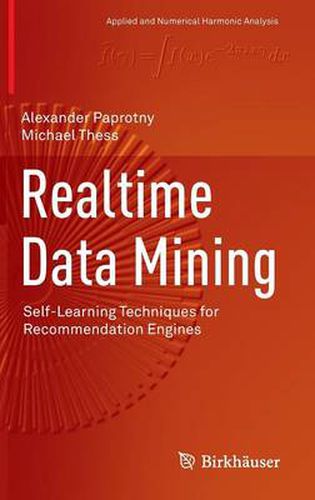Readings Newsletter
Become a Readings Member to make your shopping experience even easier.
Sign in or sign up for free!
You’re not far away from qualifying for FREE standard shipping within Australia
You’ve qualified for FREE standard shipping within Australia
The cart is loading…






This title is printed to order. This book may have been self-published. If so, we cannot guarantee the quality of the content. In the main most books will have gone through the editing process however some may not. We therefore suggest that you be aware of this before ordering this book. If in doubt check either the author or publisher’s details as we are unable to accept any returns unless they are faulty. Please contact us if you have any questions.
Describing novel mathematical concepts for recommendation engines, Realtime Data Mining: Self-Learning Techniques for Recommendation Engines features a sound mathematical framework unifying approaches based on control and learning theories, tensor factorization, and hierarchical methods. Furthermore, it presents promising results of numerous experiments on real-world data. The area of realtime data mining is currently developing at an exceptionally dynamic pace, and realtime data mining systems are the counterpart of today’s classic data mining systems. Whereas the latter learn from historical data and then use it to deduce necessary actions, realtime analytics systems learn and act continuously and autonomously. In the vanguard of these new analytics systems are recommendation engines. They are principally found on the Internet, where all information is available in realtime and an immediate feedback is guaranteed.
This monograph appeals to computer scientists and specialists in machine learning, especially from the area of recommender systems, because it conveys a new way of realtime thinking by considering recommendation tasks as control-theoretic problems. Realtime Data Mining: Self-Learning Techniques for Recommendation Engines will also interest application-oriented mathematicians because it consistently combines some of the most promising mathematical areas, namely control theory, multilevel approximation, and tensor factorization.
$9.00 standard shipping within Australia
FREE standard shipping within Australia for orders over $100.00
Express & International shipping calculated at checkout
This title is printed to order. This book may have been self-published. If so, we cannot guarantee the quality of the content. In the main most books will have gone through the editing process however some may not. We therefore suggest that you be aware of this before ordering this book. If in doubt check either the author or publisher’s details as we are unable to accept any returns unless they are faulty. Please contact us if you have any questions.
Describing novel mathematical concepts for recommendation engines, Realtime Data Mining: Self-Learning Techniques for Recommendation Engines features a sound mathematical framework unifying approaches based on control and learning theories, tensor factorization, and hierarchical methods. Furthermore, it presents promising results of numerous experiments on real-world data. The area of realtime data mining is currently developing at an exceptionally dynamic pace, and realtime data mining systems are the counterpart of today’s classic data mining systems. Whereas the latter learn from historical data and then use it to deduce necessary actions, realtime analytics systems learn and act continuously and autonomously. In the vanguard of these new analytics systems are recommendation engines. They are principally found on the Internet, where all information is available in realtime and an immediate feedback is guaranteed.
This monograph appeals to computer scientists and specialists in machine learning, especially from the area of recommender systems, because it conveys a new way of realtime thinking by considering recommendation tasks as control-theoretic problems. Realtime Data Mining: Self-Learning Techniques for Recommendation Engines will also interest application-oriented mathematicians because it consistently combines some of the most promising mathematical areas, namely control theory, multilevel approximation, and tensor factorization.